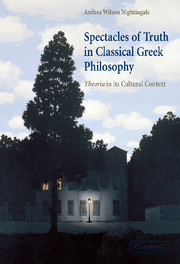Book contents
- Frontmatter
- Contents
- Acknowledgments
- Introduction
- 1 Theoria as a cultural practice
- 2 Inventing philosophic theoria
- 3 The fable of philosophy in Plato's Republic
- 4 Theorizing the beautiful body: from Plato to Philip of Opus
- 5 “Useless” knowledge: Aristotle's rethinking of theoria
- Epilogue: “Broken knowledge”? Theoria and wonder
- List of references
- Index of passages cited
- General index
- References
List of references
Published online by Cambridge University Press: 22 September 2009
- Frontmatter
- Contents
- Acknowledgments
- Introduction
- 1 Theoria as a cultural practice
- 2 Inventing philosophic theoria
- 3 The fable of philosophy in Plato's Republic
- 4 Theorizing the beautiful body: from Plato to Philip of Opus
- 5 “Useless” knowledge: Aristotle's rethinking of theoria
- Epilogue: “Broken knowledge”? Theoria and wonder
- List of references
- Index of passages cited
- General index
- References
- Type
- Chapter
- Information
- Spectacles of Truth in Classical Greek PhilosophyTheoria in its Cultural Context, pp. 269 - 299Publisher: Cambridge University PressPrint publication year: 2004



